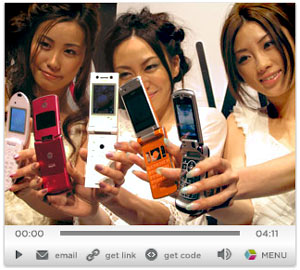Motorola Razr, Designer Phones in DoCoMo 3G Summer 7-Series
 DoCoMo today announced six summer 3G handsets, including ‘7-Series’ models from US maker Motorola, Sharp, NEC, Panasonic and Mitsubishi. The Japan-made models include three ‘designer’ phones, with ultracool shapes and colours conceived by noted Japanese design personalities, while Motorola joins the show with their M702iS and M702iG — the latter evidently based on the newest version of the widely popular ‘RAZR’ series, the Razr V3X.
DoCoMo today announced six summer 3G handsets, including ‘7-Series’ models from US maker Motorola, Sharp, NEC, Panasonic and Mitsubishi. The Japan-made models include three ‘designer’ phones, with ultracool shapes and colours conceived by noted Japanese design personalities, while Motorola joins the show with their M702iS and M702iG — the latter evidently based on the newest version of the widely popular ‘RAZR’ series, the Razr V3X.
The company unveiled the phones at a flashy press event held at the Harajuku Quest event space in central Tokyo. The three designer models, from Mitsubishi, Panasonic and NEC, offer a range of trendy colors including ‘lilac mirage’ and ’round coral’, and feature square, oval and bevel shapes based on the clam-shell form factor. DoCoMo’s choice of outside designers to create custom models is neither the first for the carrier nor for Japan and continues a popular (and lucrative) trend long developed by KDDI and Vodafone.
All phones unveiled today include, in varying mixes, the carrier’s stripped-down ‘3G-lite’ voice and data services, including roaming, ‘Chaku-moji’ (which lets the caller enter a short message that will appear on the receiver’s phone as it rings), network phonebook backup, network lock-out of a lost phone, Deco-mail (HTML mail), i-Channel and music playback. But while the carrier presented the phones as the unified ‘7-Series’, there are significant differences between the domestic and US models. The Motorolas fail to provide all of the signature lite FOMA services (lost phone lockout, PushTalk, removable memory) but they do roam, while the Japanese models don’t roam.

